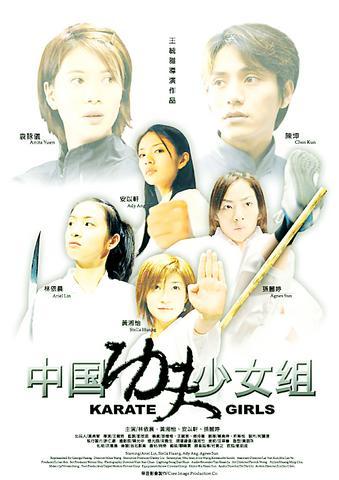Taiwan's film industry should start all over again, Hong Kong producer and president of the Federation of Hong Kong Film Workers Ng See-yuen (
The three-day conference was packed with local and international film professionals, as well as enthusiastic film students and movie fans. Together, they discussed the all-too familiar topic of how to save the Taiwanese film industry.
This time around, the country's young generation of filmmakers seemed to agree with Ng.

"Taiwan has too many film directors. But we don't have enough scriptwriters," said filmmaker Su Choa-pin (
It took Su and his team two years to write the text for Double Vision, all the while sending the script back and forth to various Hollywood producers and writers. It was the first Taiwanese movie made under the Hollywood working model, co-produced with Columbia Asia. "It was hard work, but very rewarding for me," said Su.
"In the past we always wrote our own scripts and made director's movies. But maybe it's time for a change," said Cheng Wen-tang (

Both Su and Cheng said this was a different approach to movie-making, a path distinct from predecessors such as Hou Hsiao-hsien (
As further proof of this theory, there are no Taiwanese films selected for the recently announced line-up at this year's Cannes Film Festival. South Korea and Thailand, however, are well represented. Two Korean films Hong San-soo's Woman is the Future of Man and Park Chan-wook's Old Boy have been selected for the competition section. A Thai film, Apichatpong Weerasethaku's Tropical Malady has been selected for the first time.
Hou Hsiao-Hsien has finished his latest work Coffee Time (
Discarding the tradition of looking at the world with a humanistic perspective, younger generation filmmakers are now moving toward a more innocent and less intellectual way of making films, concentrating on pure entertainment and marketable movies.
Formula 17 (
Fortunately for Yeh, the gay romantic comedy became one of the few local movies that made a profit in the past five years. The budget of the movie was just NT$4 million but it grossed NT$5 million at the box office, a small sales figure, but enough to make it the No.1 movie in terms of ticket sales this year.
This was a boost not only for Three Dots Entertainment, set up by a group of 30-somethings, but also for 23 year-old first-time director Chen Ying-jung (
Using pretty TV actors is another trend for the younger
generation of filmmakers. Alice Wang (
"My idea was to bring Taiwanese actors to mainland China and Hong Kong. A star is not born by appearing in just one film. You have to keep making movies to make them remembered by a wider audience," she said.
Wang's Karate Girls (
The film, co-produced with Bona Films in Beijing, was made with the Chinese market in mind. Thus, Wang was able to quickly raise funds for her next film, West Town Girls (
"For a long time, Taiwanese filmmakers have forgotten the basic social function of going to movies: that is to go to movies with your date, your family and friends," said Wold Chen (陳鴻元), CEO of Mata Entertainment. "Now, we are happy to see a younger generation going in a different direction," he said at the conference.

March 31 to April 6 On May 13, 1950, National Taiwan University Hospital otolaryngologist Su You-peng (蘇友鵬) was summoned to the director’s office. He thought someone had complained about him practicing the violin at night, but when he entered the room, he knew something was terribly wrong. He saw several burly men who appeared to be government secret agents, and three other resident doctors: internist Hsu Chiang (許強), dermatologist Hu Pao-chen (胡寶珍) and ophthalmologist Hu Hsin-lin (胡鑫麟). They were handcuffed, herded onto two jeeps and taken to the Secrecy Bureau (保密局) for questioning. Su was still in his doctor’s robes at

A vaccine to fight dementia? It turns out there may already be one — shots that prevent painful shingles also appear to protect aging brains. A new study found shingles vaccination cut older adults’ risk of developing dementia over the next seven years by 20 percent. The research, published Wednesday in the journal Nature, is part of growing understanding about how many factors influence brain health as we age — and what we can do about it. “It’s a very robust finding,” said lead researcher Pascal Geldsetzer of Stanford University. And “women seem to benefit more,” important as they’re at higher risk of

Last week the Democratic Progressive Party (DPP) said that the budget cuts voted for by the China-aligned parties in the legislature, are intended to force the DPP to hike electricity rates. The public would then blame it for the rate hike. It’s fairly clear that the first part of that is correct. Slashing the budget of state-run Taiwan Power Co (Taipower, 台電) is a move intended to cause discontent with the DPP when electricity rates go up. Taipower’s debt, NT$422.9 billion (US$12.78 billion), is one of the numerous permanent crises created by the nation’s construction-industrial state and the developmentalist mentality it

Experts say that the devastating earthquake in Myanmar on Friday was likely the strongest to hit the country in decades, with disaster modeling suggesting thousands could be dead. Automatic assessments from the US Geological Survey (USGS) said the shallow 7.7-magnitude quake northwest of the central Myanmar city of Sagaing triggered a red alert for shaking-related fatalities and economic losses. “High casualties and extensive damage are probable and the disaster is likely widespread,” it said, locating the epicentre near the central Myanmar city of Mandalay, home to more than a million people. Myanmar’s ruling junta said on Saturday morning that the number killed had